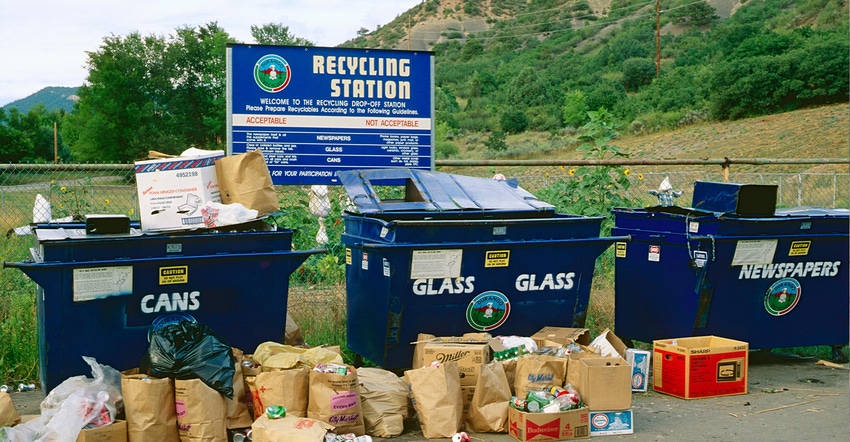Colorado Hires PRO for its EPR Program and Gears Up Beyond
A year after passing its Extended Producer Responsibility (EPR) law, Colorado has made a few monumental moves to be able to put the plan into play.

A year after passing its Extended Producer Responsibility (EPR) law, Colorado has made a few monumental moves to be able to put the plan into play. It’s hired a producer responsibility organization (PRO) to administer the program, which will require producers to pay for recycling of paper and packaging, among provisions. And it’s set a deadline of Jan. 31, 2024, for the PRO, Circular Action Alliance (CAA), to commission a needs assessment looking at existing access to recycling programs, infrastructure, and recycling capacity and to identify what’s needed to dramatically improve Colorado’s current recycling rate of about 16%, one of the lowest in the country.
Led by multiple food,beverage, and consumer goods companies—a few being General Mills, Procter & Gamble, The Coca-Cola Company, Unilever, Keurig Dr Pepper, and L’Oréal—CAA will leverage data from the assessment to set a baseline of current system performance against three vetted scenarios of improved performance.
“CAA will work closely with the third-party consultant to ensure engagement with an array of stakeholders throughout Colorado to collect data, understand the costs of the current system, identify gaps in service, and understand the unique needs of different geographic areas and entities that are engaged with the waste and recycling system,” says Olivia Barker, a spokesperson for Circular Action Alliance.
The Colorado bill, dubbed as The Producer Responsibility Program for Statewide Recycling Act, incorporates best practices from existing packaging EPRs, though the language was adapted through multistakeholder engagement to consider specific needs of Colorado’s municipalities, businesses, and residents, says Rachel Setzke, Eco-Cycle’s senior policy and research associate.
“We wrote the bill to be flexible, depending on each local government’s current system,” she says, explaining that a few Colorado jurisdictions run their own recycling programs, and a growing number of them contract with local haulers. But many jurisdictions leave collection and processing services to the for-profit sector to provide for customers who choose to sign up.
“It was vital that the Colorado law allow for local jurisdictions to continue to choose their own level of involvement,” Setzke says.
Under this law municipalities will still be able to choose their own approach. The Colorado Department of Public Health and Environment (CDPHE) will oversee the program, working with an advisory board of recycling stakeholders.
Some main bill provisions are:
Describe how the organization will meet convenience standards and statewide recycling, collection, and postconsumer-recycled-content rates;
establish a funding mechanism through the collection of producer responsibility dues that covers the organization's costs in implementing the program and costs of the department in overseeing the program;
establish a formula to reimburse 100% of the net recycling services costs of public and private recycling service providers;
provide a list of covered materials that service providers must collect to be eligible for reimbursement;
set minimum rate targets that the state will strive to meet by Jan. 1, 2030, and Jan. 1, 2035, and describe how the state can meet increased rates after 2035; and
describe a process and timeline, beginning no later than 2028, to expand recycling services to nonresidential covered entities.
Additionally, the PRO must:
Expand providers' existing recycling services to provide statewide services at no charge to covered entities for materials on the minimum recyclable list;
develop and implement a statewide education and outreach program, building on existing programs, on the recycling and reuse of covered materials;
submit an annual progress report to the advisory board.
The act establishes a penalty for the organization's or a producer's violation of the statutes and rules, which go into the “recycling resources economic opportunity fund.”
Bill sponsor Sen. Lisa Cutter (D) has from early in her tenure pushed for zero waste legislation, to include chairing a bi-partisan committee that took a deep dive into the state of waste and recycling throughout the state.
“We learned a lot, and together with a robust coalition (EcoCycle, CoPirg, Environment Colorado, Recycle Colorado, and others), we mapped out a strategy to tackle the issue over a number of years.
“EPR was an important part of the strategy, because our recycling infrastructure needed a lot of help,” she says.
Cutter points to two bill components that she sees as particularly powerful.
“I appreciate that there will be a comprehensive study before the system is set up to determine needs throughout the state. Having good information to inform the process will ensure our PRO moves forward thoughtfully and effectively.”
Incorporating eco-modulation and weight as criteria that will impact PRO dues is meaningful too, she surmises.
“Our goal in all this work is to reduce unnecessary packaging waste. If companies pay less to the PRO by using more environmentally friendly packaging, and less of it, then they benefit and so does the planet.”
Eco-Cycle calculates that in 2021, the state landfilled just under 2 million tons of recyclables (largely packaging) and recycled slightly over 530,000 tons of those same materials.
“By increasing access to recycling services and increasing statewide outreach about the value of recycling, implementation of this law could dramatically increase the tons of these valuable materials that are diverted from landfills and back into the circular economy,” Setzke attests.
California, Maine, and Oregon also have packaging EPR laws and Maryland is perhaps the furthest along in the few other states looking to implement such policies.
About the Author(s)
You May Also Like




